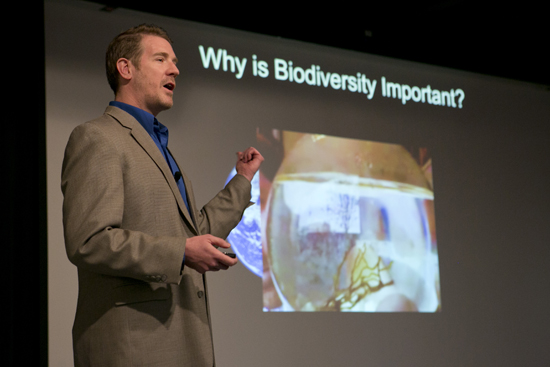The Game Maker
CAS Metcalf winner uses games to help lessons stick

John Finnerty, a College of Arts & Sciences associate professor of biology, has found that games help students understand abstract ideas by making them more accessible. Photo by Linda Haas
Passing notes, shouting, messing with fellow students’ work: such behavior doesn’t bother John Finnerty in the least—in fact, he encourages it in his class. Finnerty created the fun, freewheeling game Passing Genetic Notes in Class to teach the genetic code. He hopes this approach will help his lessons endure.
“I think there’s definitely a need to step out of the expected if you want students to hang on to what you’re going to say,” says Finnerty, a College of Arts & Sciences associate professor of biology and director of the Boston University Marine Program (BUMP). He’s found that his methods pay off in ways beyond getting students’ attention: in 2013 he won a Metcalf Award for Excellence in Teaching, one of BU’s highest teaching awards.
BU Today spoke with Finnerty about teaching, and learning from, his students.
BU Today: What made you think of using games to teach?
Finnerty: I thought it’d be surprising to do something low-tech that was engaging. I was thinking how one of my favorite things to do during holidays was to get together with my siblings and play a board game; that really gets you in the moment. The other thought was that some of the things I was describing in class were really abstract; the more tangible you can make them, the more accessible they become.
Could you give an example?
Passing Genetic Notes in Class was for freshman nonscience majors in the Core Curriculum. I had the students send coded genetic messages to each other on scraps of paper. The opposing team would be allowed to intercept the message and mutate it every so often. To make it fun, the message was supposed to specify an action; if you got it right, the group would have to perform the action (e.g., stand on one leg, scream). While intensely focusing on trying to win the game, people learn how to run the genetic code forward and backward; it doesn’t seem like this esoteric thing. We very quickly pick up rules when we’re playing a game.
What do you hope students remember most from your classes?
I tell them: “The details, you’re going to lose them. But I hope you make some kind of logical leap that changes your ability to understand something for the rest of your life.”
What have you learned from your students over the years?
Often there’s more than one way to get to the right answer; the students can show you another way to get something across. You really appreciate students who ante up; it’s probably not always comfortable for them to share why they’re not getting it.
You are involved in developing the Core Curriculum. What do you look for when creating a new course?
We should teach everyone how to be scientists. Finding something interesting with as much intellectual honesty as you can muster so you trust the data, then sharing the data and the method—those lessons are universal. So I look to infuse that kind of thinking into as many classes as possible.
What does winning a Metcalf Award mean to you?
I think it’s a validation of putting a lot of effort into teaching. You’re pressured a lot at a place like BU to be a productive scholar; this helps balance the scales. It says, “We do really care about quality of teaching; we hold it in very high esteem.”
Read more about John Finnerty’s approach to teaching here.
A version of this article was published in the fall 2013 edition of Arts & Sciences.
Julie Rattey can be reached at jrattey@bu.edu.
Comments & Discussion
Boston University moderates comments to facilitate an informed, substantive, civil conversation. Abusive, profane, self-promotional, misleading, incoherent or off-topic comments will be rejected. Moderators are staffed during regular business hours (EST) and can only accept comments written in English. Statistics or facts must include a citation or a link to the citation.